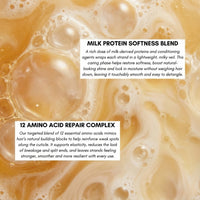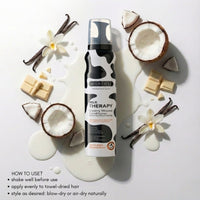The 7 Best Ways to Get Rid of Dandruff, According to Dermatologists
Posted by MORFOSE COSMETICS

The 7 Best Ways to Get Rid of Dandruff, According to Dermatologists
1. Introduction
Dandruff is a common scalp condition that affects people of all ages. It can be embarrassing and frustrating, but the good news is that it is usually easy to treat.
There are many over-the-counter dandruff shampoos available, but finding one that works for you may take some trial and error. If OTC shampoos don’t work, your dermatologist may prescribe a medicated shampoo.
In addition to shampoo, there are several other dandruff treatments that can be effective. These include scalp scrubs, probiotics, and tea tree oil. Keep reading to learn more about the 7 best ways to get rid of dandruff, according to dermatologists.
2. What is dandruff?
Dandruff is a common scalp condition that occurs when skin cells on the scalp die and flake off. It is characterized by an itchy, dry scalp that is covered in white flakes.
Dandruff is different from seborrheic dermatitis, which is a skin condition that appears on the scalp, face, chest, and other areas of the body. The main difference is that seborrheic dermatitis is usually more severe and can cause redness, swelling, and scaling of the skin.
The exact cause of dandruff is unknown, but there are several possible contributing factors, such as hormone levels, diet, or fungal infection. Dry skin is one of the most common causes, and it can be aggravated by cold weather, harsh shampoos, and other products, stress, and illness.
3. What are the causes of dandruff?
Though the exact cause of dandruff is unknown, some possible contributing factors could lead to it, such as:
- Dermatological disorders, such as seborrheic dermatitis, psoriasis, and eczema
- Not washing your hair properly
- Not frequently shampooing enough
- Hormonal and environmental triggers, such as stress, illness, and cold weather
- Using harsh products and chemicals on your hair and scalp
- Diet – Fatty and sugary foods can be a trigger
- Genetics
- Fungal infections
Dandruff is also more likely to occur during particular times of life, such as during puberty or pregnancy. Additionally, individuals with scalp sensitivity or who have oily scalps are more prone to developing dandruff.
4. What are the best ways to get rid of dandruff?
Dandruff itself is not a serious condition, however, it can be a persistent and embarrassing problem. Luckily, there are various ways to get rid of dandruff, such as:
1. Use a mild shampoo and an anti-dandruff shampoo – Moisturizing your scalp with a mild shampoo helps reduce inflammation and itching. For an added boost, an anti-dandruff shampoo containing ingredients such as zinc pyrithione or selenium sulfide can reduce inflammation, soothe the skin, stop the overgrowth of fungus, and keep the scalp moisturized.
2. Wash regularly – Washing your hair regularly and scrubbing your scalp helps tackle the fungus and reduce dandruff flakes. Try not to wash your hair more than every second day, as this could have an adverse effect by irritating the scalp and causing an overproduction of oils.
3. Apple cider vinegar rinse – An apple cider vinegar rinse helps to restore your scalp's pH balance, rinse away dead skin cells, and disinfect the scalp.
4. Diet – A healthy diet rich in Omega-3 fatty acids, zinc, and vitamin B helps with dandruff prevention.
5. Moisturize regularly – To reduce dryness and itching, use a daily moisturizer or lotion containing coconut or almond oil for hydration and Vitamin E for nourishment.
6. Get plenty of sleep – Not getting enough sleep or
5. How can you prevent dandruff from coming back?
Dandruff is a common and persistent problem, but it doesn’t have to be. To prevent dandruff from coming back, there are some things you can do to keep your scalp healthy and happy.
1. Detangle your hair before washing it. This will help reduce the amount of friction on your scalp, which can reduce irritation and help you avoid the formation of dandruff in the first place.
2. Avoid using products that contain harsh chemicals, such as hair dyes and bleaching agents. These can cause excess oiliness and irritation of the scalp, leading to dandruff.
3. Be gentle when you shampoo your hair, as vigorous washing can cause breakage and other scalp issues.
4. Stick to natural products and homemade scrubs. Using products with natural ingredients, such as coconut oil or apple cider vinegar, can help restore your scalp’s natural balance, reduce irritation, and help you avoid further scalp issues.
5. Reduce your stress levels. Stress can contribute to dandruff and other scalp issues, so make sure you take some time out of your day to relax and unwind.
6. When should you see a dermatologist for dandruff?
When should you see a dermatologist for dandruff? If your dandruff persists or worsens after trying some of the steps listed above, it may be time to consult a dermatologist.
A dermatologist can help determine the cause of your dandruff and develop the best treatment plan for you. They may also prescribe medication for severe cases of dandruff or even order tests to rule out any underlying conditions that may be causing the problem.
Dermatologists can also help you identify other conditions that may be contributing to your dandruff, such as skin conditions like psoriasis or seborrheic dermatitis.
Seeing a dermatologist can also help provide peace of mind as they will be able to properly diagnose and treat your condition in the most effective way possible.
7. Dandruff myths – debunked!
When it comes to dandruff, there are plenty of misconceptions out there. Here we will debunk some of the most common dandruff myths so that you can manage your dandruff as best as possible:
1. Myth: Dandruff is not caused by a fungus.
fact: While it is true that dandruff is not caused solely by a fungus, fungi do play a role in dandruff. Malassezia, a type of fungus, feeds on the natural oils your scalp produces and can cause flaking of the scalp.
2. Myth: You can’t get rid of dandruff.
fact: You can get rid of dandruff with the right treatment. Depending on the severity of dandruff, anti-dandruff shampoos, medicated shampoos, and even prescription medications can all aid in eliminating dandruff.
3. Myth: Dandruff is caused by a dry scalp.
fact: Dandruff can occur regardless of scalp moisture levels. Dandruff can be worsened by dryness but is caused by the overgrowth of the Malassezia fungus which can occur at any moisture level.
4. Myth: Dandruff can be contagious.
fact: Dandruff is not contagious as it is only caused by a fungus that is already present on everyone’s head. You cannot “
TAGS:



